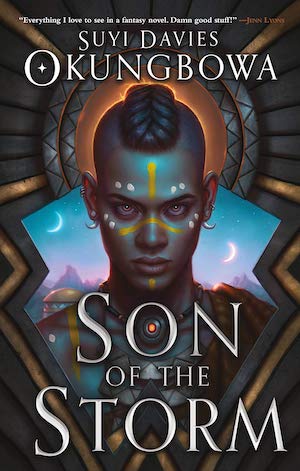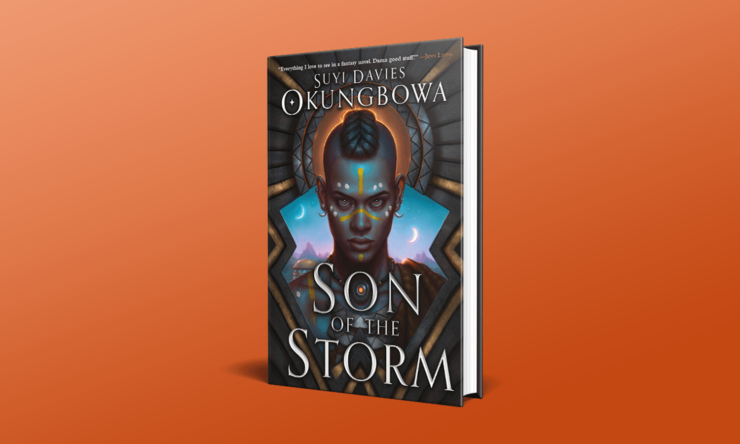In the city of Bassa, everything exists in a strict hierarchy. Fifteen districts spiral out from the center, each populated by people locked into a caste through complicated social, political, and cultural equations. Danso, a novitiate scholar, is one of those lower castes due to being Shanshi, or biracial. No matter how hard he tries to exceed their expectations, everyone expects him to fail due to his supposedly innate inadequacies. His bride-to-be is Esheme, another Bassai whose dubious parentage has placed her in a lower caste. She, however, is not content to fight for scraps when the whole table is up for grabs.
When an injured islander spellcaster named Lilong crashes into Danso’s life, she brings with her the promise of violent change in the form of ibor, a material that gives the person wielding it impossible powers. An iborworker can change the color of their skin, manipulate the elements, even raise the dead into zombie puppets. As each of the trio get their hands on this powerful weapon, the future of Bassa is called into question. One wants to reform the system, another wants to abandon it to the consequences of its own making, and a third wants to destroy it and rebuild it in their image. Nothing will ever be the same.
The whole novel is strong all around, but Son of the Storm does two things very, very well: worldbuilding and character development. The world in the Nameless Trilogy feels multilayered and, well, epic. Inspired by pre-colonial West Africa, Okungbowa infuses his landscape with vivid descriptions of tastes, scents, textures, sounds, and sights. Danso and Esheme don’t just walk through the city streets; we experience it with them. The amount of detail he puts into each scene is impressive. I tend to turn what I’m reading into an image in my head so I’m “seeing” what I’m reading. Okungbowa makes that visualization easy, especially with the magic. By the end of the first book, readers have a good sense of how the magic of this world works as well as how little the characters actually understand about it. We are learning about ibor at the same time as Danso, Esheme, and Lilong.
The culture and politics of his world are just as intricately drawn as the physical world. It takes a while for the patterns to become clear, but that’s because we get only the information we need when Okungbowa decides we need it. Despite long chunks of expository text breaking up moments of action, it rarely feels like he is info dumping. He keeps the pacing flowing, even in moments where nothing is happening.
Buy the Book


Son of the Storm
As for character development, this is a story where the reader expects certain tropes and is surprised with some killer twists. Lilong is the character experiencing the standard epic fantasy quest. She must recover magical islander artifacts before the evil colonizers use them to attack her people. But Lilong isn’t the main character of this story. Her quest slams into Danso, much to her chagrin, and all of the things she believes about mainlanders and her destiny is suddenly called into question. Esheme, likewise, is not the character we expect. At first she is the put-upon woman marrying a man who doesn’t deserve her. She wants to stretch her wings, but feels caged by her mother’s reticence and her fiance’s mediocrity. When given the opportunity to take what she feels is owed her, she doesn’t hesitate. There is nothing demure about Esheme. She is a bulldozer of a woman.
What Lilong and Esheme have in common is how they, like us, fail to understand who Danso is. In the beginning, all we see is a man who is the living embodiment of wasted potential. Esheme thinks she might be able to shape him into something useful, while Lilong wants to throw the whole man in the trash. However, Danso isn’t really useless, he just has skills and interests Bassa doesn’t value. Perhaps if he had been raised by his islander mother instead his talents would’ve been nurtured rather than punished. Fortunately, that constant belittling imbued in him a sense of humility, a virtue that will have an outsized effect on events later in the novel.
Son of the Storm falls into some frustratingly common tropes about biracial people. For example, Danso and other Shanshi are treated like they’re half of this and half of that but somehow still less than both, a thing I, a biracial person, am deeply tired of seeing in speculative fiction. I long for the day when we drop that from the collective trope lexicon. But I think overall Okungbowa does a solid job of showing how Danso’s difficulties as a biracial person are not caused by anything he’s done but by the oppressive caste system.
The racial hierarchy in Bassa places those with the darkest skin at the top and those with the lightest at the bottom. Those in between are called Shashi and they are often the product of relations between dark skinned mainlander and light skinned outlander, such as from the islands or deserts. The hierarchy is not just about skin color but about national heritage as well. Danso’s mother was an islander, and the Bassai disdain for her people is a toxic melange of racism, colorism, xenophobia, and colonialism that congeals into a caste system where Danso is forever scrabbling just to keep his place in the middle.
Because when it comes down to it, Son of the Storms is a story about power—who has it, who doesn’t, and the lengths people will go to secure it for themselves. Bassa is a house of cards. The lowest castes believe they have no power when in reality Bassa cannot function without them. Upset the power balance and the whole thing comes tumbling down. Once the lowest learn how important they really are, there’s no stopping them. That could be a good thing for someone like Danso who finds freedom in rejecting Bassa’s demands, or a terrible thing for someone like Esheme who sees imbalance as an opportunity to exploit the system for her own benefit.
Suyi Davies Okungbowa really understands epic fantasy, both the rules of the subgenre and the most effective ways to break those rules. Fans of epic fantasy will find a lot to love here, yet Okungbowa also makes sure those who are new or not as experienced with epic fantasy won’t be too overwhelmed. Son of the Storm is a great first book in what looks to be an exciting trilogy.
Son of the Storm is available from Orbit.
Alex Brown is a librarian by day, historian by night, author and writer by passion, and a queer Black person all the time. Keep up with them on Twitter, Instagram, and their blog.










